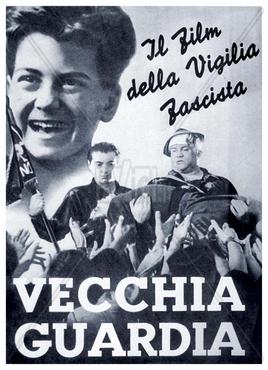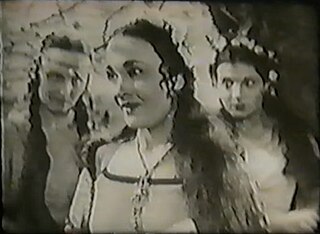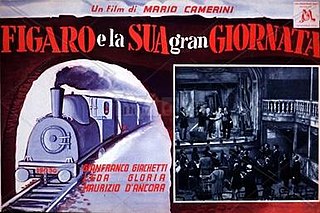
The Lady in White is a 1938 Italian "white-telephones" comedy film directed by Mario Mattoli and starring Elsa Merlini, Nino Besozzi and Enrico Viarisio. The film's sets were designed by the art director Piero Filippone. It was shot at the Farnesina Studios of Titanus in Rome.

Nino Besozzi was an Italian film actor. He appeared in more than 50 films between 1931 and 1970. He was born in and died in Milan, Italy.

Marisa Merlini was an Italian character actress active in Italy's post-World War II cinema. Merlini appeared in over fifty films during her career, which spanned from World War II to 2005. In Luigi Comencini's 1953 film Pane, amore e fantasia, she portrayed Annarella, a village midwife, who marries the local police marshal, played by Vittorio De Sica.

The Private Secretary is a 1931 Italian "white-telephones" musical film directed by Goffredo Alessandrini and starring Elsa Merlini, Nino Besozzi and Sergio Tofano. It was the Italian-language version of the German film Die Privatsekretärin.

The Payoff is an Italian crime comedy film directed in 1978 by Sergio Corbucci. It is based on the 1976 crime novel of the same name by the writer Attilio Veraldi.

La seconda notte di nozze is an Italian comedy-drama film directed by Pupi Avati. It entered the 2005 Venice Film Festival. For this film Katia Ricciarelli won Nastro d'Argento for Best Actress.

The Old Guard is a 1934 Italian drama film directed by Alessandro Blasetti and starring Gianfranco Giachetti, Mino Doro, and Franco Brambilla. It was one of several pro-Fascist films made by Blasetti during the era. The film is set in a small Italian town in 1922, where a local group of Fascist blackshirts battle against rival socialists who have called a strike at the hospital. Mario, the young son of Doctor Cardini, is killed in the fighting. The film ends with the March on Rome that brought Benito Mussolini to power.

Ginevra degli Almieri is a 1935 Italian historical drama film directed by Guido Brignone, starring Elsa Merlini and Amedeo Nazzari. Merlini had spotted Nazzari during a stage play, and lobbied for his casting in his film debut. Nazzari went on to be a leading star of Italian cinema. It is set in Florence in the fifteenth century.

Destination Piovarolo is a 1955 Italian comedy film directed by Domenico Paolella.
The Queen of Navarre is a 1942 Italian "white-telephones" historical film directed by Carmine Gallone and starring Elsa Merlini, Gino Cervi and Renato Cialente. It was made at the Cinecittà Studios in Rome, based on a play by Eugène Scribe. The film portrays a series of intrigues at the Madrid court of Charles V in the Sixteenth century.

To Live is a 1937 Italian musical drama film directed by Guido Brignone and starring Tito Schipa, Caterina Boratto and Nino Besozzi. The film is noted for its title song, composed by Cesare A. Bixio. It was distributed by the Italian subsidiary of MGM.

Thirty Seconds of Love is a 1936 Italian romantic comedy film directed by Mario Bonnard and starring Nino Besozzi, Elsa Merlini and Enrico Viarisio.
Model Wanted is a 1933 Italian "white-telephones" comedy film directed by E. W. Emo and starring Elsa Merlini, Nino Besozzi, and Gianfranco Giachetti. It is the Italian-language version of the German comedy film Marion, That's Not Nice, also directed by Emo.
Unripe Fruit is a 1934 Italian comedy film directed by Carlo Ludovico Bragaglia and starring Lotte Menas, Nino Besozzi and Maria Wronska. A German-language version of the same story was made in Austria as A Precocious Girl.

The Last Dance is a 1941 Italian "white-telephones" comedy film directed by Camillo Mastrocinque and starring Elsa Merlini, Amedeo Nazzari and Renato Cialente. It is considered to be in the tradition of White Telephone films, popular during the Fascist era. It is based on a play by the Hungarian writer Ferenc Herczeg and features Merlini in a dual role as mother and daughter.

Figaro e la sua gran giornata is a 1931 Italian comedy film directed by Mario Camerini and starring Gianfranco Giachetti, Leda Gloria and Ugo Ceseri.

The Cuckoo Clock is a 1938 Italian historical mystery thriller film directed by Camillo Mastrocinque and starring Vittorio De Sica, Oretta Fiume and Laura Solari. It was shot at the Cinecittà Studios in Rome and on location in Livorno. The film's sets were designed by the art director Gino Brosio.

Be Seeing You, Father is a 1948 Italian period comedy film directed by Camillo Mastrocinque and starring Gino Bechi, Mariella Lotti and Silvana Pampanini. The film's sets were designed by the art director Ottavio Scotti. The film was a breakthrough for Pampanini, who outshone the more established female star Lotti and rapidly gained appeal at the box office.

I'll Always Love You is a 1933 Italian romantic drama film directed by Mario Camerini and starring Elsa De Giorgi, Nino Besozzi and Mino Doro. It was shot at the Cines Studios in Rome. The film's sets were designed by the art director Gastone Medin. A separate French-language version Je vous aimerai toujours was also produced. In 1943 Camerini remade the film under the same title.

Giuseppina "Pina" Bottin was an Italian actress. She worked in various Italian films and television programs from 1953 to 1970.

















